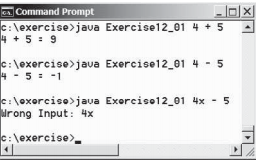(NumberFormatException) Listing 7.9, Calculator.java, is a simple commandline calculator
belongs to book: Introduction to Java Programming, Comprehensive Version (10th Edition)|Y. Danial liang|10th edition| Chapter number:12| Question number:1
All Answers
total answers (1)





 Java programming
Java programming
CalculatorWithoutException.java
need an explanation for this answer? contact us directly to get an explanation for this answer